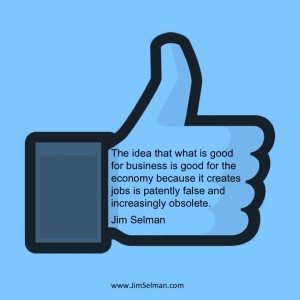 Fareed Zakaria recently did a special on CNN about the state of the American Economy. Various pundits and experts were engaged in the question ‘If the economy is growing why aren’t we seeing more jobs for the middle class’? It’s a good question and reveals a startling but obvious revelation: Business isn’t interested in creating jobs — in fact, business would like to eliminate as many jobs as possible! The idea that what is good for business is good for the economy because it creates jobs is patently false and increasingly obsolete.
Fareed Zakaria recently did a special on CNN about the state of the American Economy. Various pundits and experts were engaged in the question ‘If the economy is growing why aren’t we seeing more jobs for the middle class’? It’s a good question and reveals a startling but obvious revelation: Business isn’t interested in creating jobs — in fact, business would like to eliminate as many jobs as possible! The idea that what is good for business is good for the economy because it creates jobs is patently false and increasingly obsolete.
Much of the recent growth has been technology and efficiency driven and at the expense of millions of real and potential jobs. For example, for any of us that fly we can now make our reservations, check-in and board our planes with barely any human contact with airline personnel. Not only that, we are doing the work that used to be someone’s job. One of my personal peeves is telling a computer all of sorts of information before I can speak to a human being. Again, using my time to eliminate someone’s job. With the coming of mobile wallets we can now enter a store, pick and scan our merchandise and leave the store without having to speak to a salesperson. Isn’t it clear that efficiency and cost cutting translates into fewer jobs? We are told that technology creates new jobs and sometimes that is true, but usually fewer and more skilled jobs than were replaced.
This is progress and with the current press for innovation it will only accelerate the elimination of our ‘jobs’. However, as this is happening we can also observe that the concept of what a job really is, is transforming. When we can no longer expect a business or a corporation to provide us work, we inevitably reach the conclusion that if we are going to work it all, we must create our own job. As this occurs we can also realize that our value is and always has been whatever it is we offer. Under the old notion of ‘job’ we offered a company our skills and labor and the company sold the result of our work to their customers and made their profit on top of whatever they were paying us.
 Now individuals must decide what they have to offer and make such offers directly to those who want and need what is offered. Each of us is becoming a solo-entrepreneur, what I call indepreneurs. This is already almost a ‘norm’ among younger people who’ve developed a knack for working on projects, as consultants, as coaches, as innovators in niche markets. As these indepreneurs find success, they require all of the sorts of support services they previously took for granted such as finance, accounting, production, marketing, logistics and so forth. What’s emerging are networks of previous ‘workers’ able to invent and contribute whatever they see is needed and wanted. These networks are challenging traditional organizational and business models.
Now individuals must decide what they have to offer and make such offers directly to those who want and need what is offered. Each of us is becoming a solo-entrepreneur, what I call indepreneurs. This is already almost a ‘norm’ among younger people who’ve developed a knack for working on projects, as consultants, as coaches, as innovators in niche markets. As these indepreneurs find success, they require all of the sorts of support services they previously took for granted such as finance, accounting, production, marketing, logistics and so forth. What’s emerging are networks of previous ‘workers’ able to invent and contribute whatever they see is needed and wanted. These networks are challenging traditional organizational and business models.
Examples of these networks are redefining entire industries, from Uber’s impact on local transportation to Airbnb on the hotel industry. But also many traditional middle class service functions such as accounting, financial management, human resources, logistics and even senior management are being taken over by networks of individuals willing to work part-time or through virtual arrangements at lower cost to the company with little or no impact on the quality and value of what is offered.
What is often difficult in making this transition from job-holder to indepreneur, is a mindset of personal responsibility for one’s value and the willingness to communicate an offer in the marketplace. Many local ‘networking’ organizations already exist, as does LinkedIn and other platforms designed to facilitate buyers and sellers doing business.
 This isn’t easy, but it is the future of jobs. When I am working with my friends and others facing this choice I am reminded of one of Goethe’s couplets, “Whatever you can do or dream you can, do it. Boldness has genius, power and magic in it”.
This isn’t easy, but it is the future of jobs. When I am working with my friends and others facing this choice I am reminded of one of Goethe’s couplets, “Whatever you can do or dream you can, do it. Boldness has genius, power and magic in it”.
